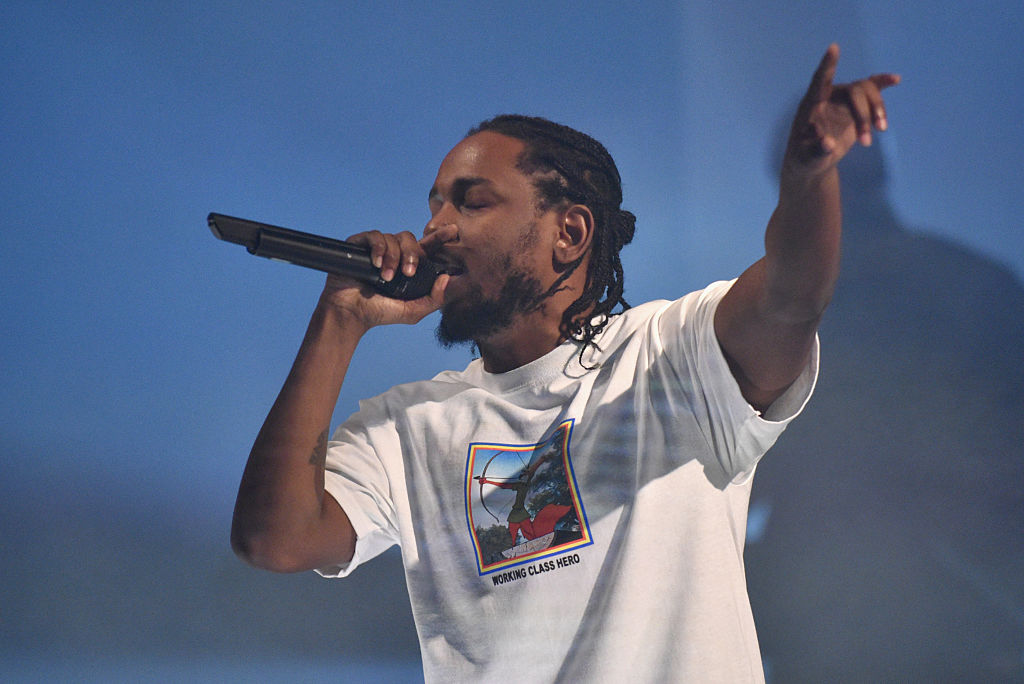Kendrick Lamar‘s interview with Zane Lowe today did not come with any new music, but Lamar did open up the process and inspirations behind DAMN., as well as about his influences, the legacy of To Pimp a Butterfly, and the American political climate. Find some highlights below.
He spoke about specific songs on the record: He called “BLOOD.” a representation of “a new life,” said “DNA.” was influenced specifically by Ice Cube’s approach, and that he pictured Rihanna on “LOYALTY.” as soon as he heard a draft of the song. He also said he likes to create different personalities through pitch and vocal manipulation.
The most interesting discussion dealt with the album’s final, explicitly autobiographical track “DUCKWORTH.”:
Lowe: When did you when did you realize that that story had happened?
KL: When did that story get shared with you? About a year after I met Top Dawg. I met him when I was 16. My Pops came to the studio after I’d been locked in with him for a minute and we got a relationship now, bring my Pops through. He heard I was dealing with Top Dawg but my Pops personally don’t know him as Top Dawg, the industry know him as Top Dawg… So when he walked in that room and he seen that Top Dawg was this guy, he flipped. Still ’til this day they laugh and they laugh and they trip out and they tell the same story over and over to each other.
Lowe: Have you been waiting to tell that story?
KL: Have I been waiting? It was just the right time. Top himself didn’t know I was going to do it or even execute it in that fashion, to be the last song or to be anywhere. Just making it make sense. I remember playing it for him, he flipped because further than the song, when you really can hear your life in words that is so true to you and that effected your life one hundred percent through one decision, it really makes you sit back and cherish the moment.I think that’s something we all did playing that record. Like man, look where we at. We’re recording music for the world to hear and we’re taking care of our families. We’re blessed. But listen to these words, like this is what happened.This is real life. It’s amazing and since a kid I’ve aways said to myself ‘anything is possible and it always comes around 10 fold, confirmation.’ And that story is confirmation.
Kendrick said he has unreleased records that cover politics more specifically (“based on the ‘Wow’ factor…on ‘what’s going on’?) than DAMN. Speaking about the lack of specific references to Trump and the current political climate on DAMN., Kendrick said that his message is implicit in the power of the music:
I wanted more self-evaluation and discipline, because of what’s going on now. We’re not focusing on him. What’s going on now—we focusing on self. You see real different nationalities and cultures are coming together and actually standing up for themselves and I think that’s a pure reflection of this record prior to this even happening prior to even coming out. We say OK we can’t control—now we see we can control what’s going on out there. It was a whole ‘nother power that be, so what we can now is we can start coming together and figuring out our own problems and home solutions. I think, I believe, I know, this is what this album reflects.
He also spoke about his feud with Geraldo Rivera and Fox News, referenced on “YAH.,” saying that he thought “it was a trap. I thought it was clickbait, because anybody that know me they know that you know I represent my people you know and the culture the right way so to try and attack my character you know and make it an actual stunt. I wasn’t for it.”
He discussed DAMN. in relationship to the more political To Pimp a Butterfly, and that album’s legacy:
It was something that I wanted to shed light on. What was going on in my community, what was going on around the world, what was going on with my people. I always feel the need to approach it in the aspect where I’m not only thinking about right now, this record has to live and teach the same way Talib, the same way Jay, the same Common, the same way Ice Cube taught us back in ’91. I went back fifteen years later and I’ve learned from it.
This album has to teach, not only in these times but for the future. To understand our history, what we was going through in 2010, 2012, 2014, 2015 and you can go back and apply that knowledge with whatever’s going on in the future. That right there is going to help the next individual, the next Kendrick Lamar, the next kid on the corner to make whatever situation they’re in, a better situation. Not only for them self but for those around them. The success of that record didn’t come from the accolades or the awards, for me came from people going out there and singing “Alright” in the middle or these streets and taking pride and dignity into where they come from and where they want to go and expressing them self.
When asked about his relationship to Obama and viewpoint on his presidency, Kendrick said:
What I took from that experience was the idea of knowing that it’s going to take more than the eight year idea or four year idea of change. A lot of times being a kid when he was elected, not a kid just a younger adult, we get the idea – well I got the idea that shit was going to do a 360 like that. So me have a conversation with him and him sitting me down, he says ‘change doesn’t start while I’m here, it starts once we leave the space that we’re in.’ That was the idea.
Subconsciously, that goes that idea of me self evaluating my own personal thoughts the way I think and what I would take from this meeting when I go outside the building. So that was the experience. That’s something I will always hold dear just the idea of knowing that in the moment of time I have to think further the this year or last year. You got to prep yourself for the next decade of what you want to do that’s going to result to change an idea or thoughts that we have consumed for so many years.
Kendrick spoke about his claim that he is the “greatest rapper alive” in the interview, and the idea that “there is always a throne in hip-hop”:
I’m so passionate about hip-hop. I don’t know what era everybody else comes from but I listened. We play house parties, bro, every night. I love it to a point that I can’t even describe it. When I heard these artists say they’re the best, coming up, I’m not doing it to have a good song or one good wrap or good hook or good bridge. I want to keep doing it every time, period. And to do it every time, you have to challenge yourself and you have to confirm to yourself, not anybody else, confirm to yourself that you’re the best, period. No one can take that away from me, period. That’s my drive and that’s my hunger, I will always have. At this point right now, the years and the time and the effort and the knowledge and history I’ve done on the culture and the game I’ve gotten from those before me and the respect I have for them. I want to hold myself high on that same pedestal 10, 15 years from now.
Listen to the interview via Beats 1, or watch below.
https://embed.itunes.apple.com/us/embedded-player/idsa.193137a0-2629-11e7-bb2e-fa528de050a0





